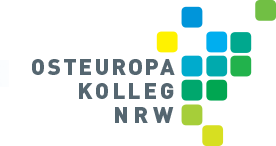Why the Osteuropa-Kolleg?
Since the 19th century exists a deep cultural, economical, political and family connection to Eastern Europe that formed amongst other things through many migration waves in the area of the later North Rhine-Westphalia, especially in the Ruhr area. Considering this, it’s no surprise that a unique density of Eastern-Europe-focused institutions can be found in this region. Not only academic ones like the according subjects at the Ruhr-University Bochum or at the westphalien Wilhelms-University Münster, but also a variety of non-academic institutions focused on Eastern Europe can be found there. To better reach the regional audience, enhance the cooperation between the participating institutions and out of the desire to give Eastern Europe a stronger voice in the public debate, to show more presence and to master the challenges of new knowledge, mediation and classification coming from Eastern Europe to us, the idea of the Eastern Europe College was born.
What does Eastern Europe mean to us?
We consider Eastern Europe as an area with a diverse historic-cultural landscape and historical grown entanglements that extends from Poland to the post-soviet states and from Southeast Europe to the borders of turkey. Its cultural, political and social diversity has a fascinating effect to the present day. Non the less it also carries potential for conflicts that lead to the current concerns in Western Europe.
What is the Osteuropa-Kolleg?
The Kolleg is a union of academic and non-academic institutions under one umbrella organization, without limiting the autonomy of single institutions; it coordinates the collaboration between the different members. The work of the Kolleg is aimed on the initiation, organization and coordination of research, courses, exhibitions and other events connected with culture, society, language and politics in Eastern Europe from the beginning of modern history till today.
We maintain close relationships to Eastern European institutions. Experts and institutions from Eastern Europe are included in the college activities. International dialogue and cooperation beyond borders is a crucial part of the college activities.







